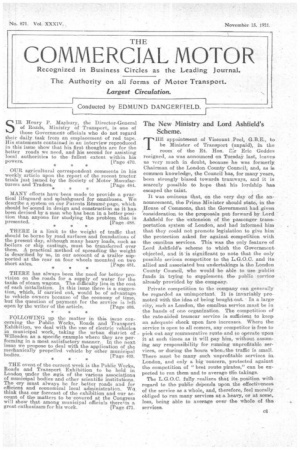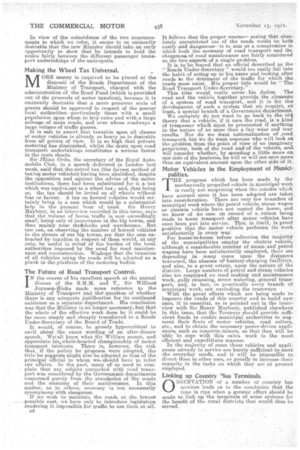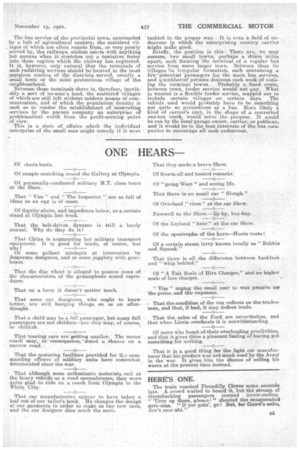The New Ministry and Lord Ashfield's Scheme.
Page 1

Page 2

Page 3

If you've noticed an error in this article please click here to report it so we can fix it.
THE appointment of Viscount Peel, G.B.E., to be Minister of Transport (unpaid), in the room of the Rt. Hon. Cr Eric Geddes resigned, as was announced on TuesdaY last, leaves us very much in doubt, because he was formerly Chairman of the London County Council, a.nd, as is common knowledge, the Council has, for many years, been strongly biased towards tramways, and it is scarcely possible to hope that his lordship has escaped the taint. .
It was ominous that, on the very day of tie announcement, the Prime Minister should state, in the House of Commons, that the Government had given consideration to the proposals put forward by Lord Ashfield for the extension of the passenger transportation system of London, and had informed him that they could not promote legislation to give him the protection asked for against -competition with the omnibus services. This was the only feature of Lord Aehfield'is scheme to which the Government objected, and it is significant to note that the only possible serious competitor to the L.G.O.C. and its allied and associated bus undertakings i6 the London County Council, who would be able to use publie funds in trying to supplement the public service already provided by the corapany.
Private competition to the company can generally be regarded as unimportant. It is invariably promoted With the idea of being bought out. In a large city, such as London, the omnibus service must be in the hands of one organization. The competition of the rate-aided tramcar service is sufficient to keep an adequate' check upon fare increases. Where the service is open to all corners, any competitor is free to pick out any remunerative route and to operate upon it at such time as it will pay him, without assuming any responsibility for running unprofitable services, or during the hours wheeithe traffic is small. There must be many such unprofitable services in Landon, and only a big 'concern, protected against the, competition of "best route pirates," can be expected to run them and to average the takings.
The L.G.0,C. fully realizes that itsposition with regard to the public depends upon the effectiveness of the service as a whole, and, therefore, feel morally obliged to ran many services at a heavy, or at some, loss, being able to average over the whole of the
In view of the coineidenc,e of the two announcements to which we refer, it seems to us eminently desirable that the new Minister should take an early opportunity to show that he intends to hold the scales fairly between the different passenger transport undertakings of the metropolis.
Making the Wheel Tax Universal.
MORE money is required to be placed at the disposalof the Roads Department of the Ministry of Transport, charged with the administration of the Road Fund (which is provided out of the proceeds of motor taxation), because it is eminently desirable that a more generous scale o4 grants should be approved in respect of the poorer local authorities—particularly those with a small population, upon whom to levy rates and with a large mileage of main roads, and over whose roadways a large volume of traffic passes.
It is safe to assert that taxation upon all classes of motor vehicles is already as heavy as is. desirable from all points of view. It is so high that private motoring has diminished, whilst the drain upon road transport undertakings constitutes a serious factor in the costs sheets.
Sir ..11 limn Orde, the secretary of the Royal Automobile Club, in a speech delivered in London last week, said that the .petrol tax (the fairest method of taxing motor vehicles) having been abolished, despite the opposition and against the advice of the motor institutions, there had been substituted for it a tax which was equiva.ent to a wheel tax ; and, that. being so, the tax should be levied on all wheels without fear or favour. A tax on horsed vehicles would certainly bring in a. sum which would be a substantial help in the preeent hour of need. Sir Henry Maybury, in an interview recorded in this issue, eays, that the volume of horse traffic is now exceedingly small, being only of importance in the big towns, and then mainly near thedoeks and warehouses. But one cam, on observing the number of horsed vehicles in the streets of our big towns, see that the sum extracted by taxation in respect of them would, at any rate, be useful in relief of the burden of the local authorities imposed by the need for road maintenance and reconstruction. Weehope that the taxatioA of all vehicles using the roads will be adopted ae a plank in the, platform of the motoring bodies,
The Future of Road Transport Control.
IN the course of his excellent speech_ at the annual dinner of the S.111.31: and T., Sir William) Joynson-Hicks made some reference to the Ministry of Transport and the question of whether there is any adequate justification for its continued existence as a separate department. His conclUsion was that the Ministry is no longer necessary, but that the whole of the effective work done by it could be, far more simply and cheaply transferred to a Roads Under-Secretary of the Board of Trade. It would, of course, be grossly hypercritical to cavil about the exact wording of an after-dinner speech. Weeall know what Sir Willie's] meant, and appreciate histwhole-hearted championship of motor, transport interests. There is, however, the risk that, if the policy he proposes were adopted, the title he suggests might also be adopted as that of the principal official to whom weeshould have to refer our affairs. In the past, many of: us used to complain that any subject connected with road transport was considered by the Government departments concerned purely from the standpoint of the roads and the economy of their maintenance. In this mattes., as in others, economy is. not necessarily synonymous with cheapness.
If we wish to maintain the roads at the lowest possible cost, we have only to introduce legislation, rendering it impossible for traffic to use them at all. e2 It follows that the proper course— seeing that absolutely unrestricted use of the roads would be bath costly. and dangerous—is to aim at a compromise in which both the economy of road transport and the vheapnesa of Toed maintenance are fairly considered as the two aspects of a. single problem. ' It is to be feared that an official described as the "Roads Under-Secretary" would too easily fall into the habit of acting up to his name and looking after roads to the detriment of the traffic for which the roads must exist. His, proper title would be " The Road Transport Under-Secretary."
This title would really cover his duties. The road arid the vehicle together provide the elemeate of a asystem of road trails-port, and it is for thei development of such a system that ere require, at least, a special branch of a Government department. We certainly do not want to go back to the old theory that a vehicle, if it uses the road, is A kind of trespasser which must, be preseeuted if anything in the nature of no more than a fair wear and tear results. Nor do we 'rant nationalization of' ,road transport, but we do want someone who will look a4 the problem from the point of view of an imaginary proprietor, both of the road and of the vehicle, and will consider whether, by spending a little more on one side of the business, he will or will not save more than an equivalent amount upon the other side of it.
Motor Vehicles in the Employment of Municipalities.
T,HE progress which has been made by the mechanically propelled vehicle in municipal work is really not surprising when the benefits which have accrued since it has been adopted are taken into consideration. There are very few branches of municipal work where the petrol vehicle, steam wagon or electrie vehicle have not ousted the horse, and we know of no case on record of a return being made to horse transport after motor vehicles have once been put into service. This, in itself, is proof positive that the motor vehicle performs its work satisfactorily in every way. For house-to-house refuse collection the majority of the municipalities employ the electric vehicle, although ze considerable number of steer] and petrol wagons have been satisfactorily employed, their use depending in many eases upon the distances traversed, the absence of battery-charging facilities, and also, to a great extent, upon the nature of the district. Large numbers of petrol and steam vehicles also are employed on road making and maintenance work, gully cleansing, street watering, general transport, and, in fact, in practically every branch of municipal work, not excluding the tramways. With the great efforts which are being made to improve the roads of this country and to build new ones, it is essential, as is pointed out in the inter' view with Sir Henry Maybury, published elsewhere in this issue, that the Treasury should provide sufficient funds to enable niunicipal authorities to augment their fleets of motor vehicles, road rollers, etc., and to obtain the necessary power-driven appliances, such as concrete mixers, so that they will be -able to cope with this extra work in the most efficient and expeditious manner.
In the•majority of eases those• vehicles and appliances already in service are barely sufficient to meet the everyday needs, and it will be impossitle to divert them to other uses, or greatly to increase their capacity in the tasks on which they are at present employed.
Linking up Country 13us Terminals.
0 BSERVATION of a number of country bus service:4 leads us to the conclusion that the time is ripe when a greater effort should be made to link up the terminals of some systems. for the benefit of the rural districts that would thus he served. The bus service of the provincial town, surrounded by a belt of agricultural ceuntry, the scattered villages of which are often remote frqm, or very poorly served by, the railways, seldom meets with anything but success when it stretches out a tentative • feeler into those regions which the railway has neglected. It is, however, only natural that the terminals of such radiating services should belocated in the most :populous centres of the districts,. served, nsually a small town or the most pretentious village of the neighbourhood. Between these terminals there is, therefore, inevite ably a sort of no-man's land, the scattered villages of which are still left without modern means of cOninrunication, and of which the popidation density is such as to render the establishment of cone acting ;services by the parent company an enterprise of problematical worth from the profit-earning point of view.
This is a state of affairs which the individual enterprise of the small man might remedy if it were tackled in the proper way. it is even a field of endeavour in which the enterprising country carrier might miike good.
Briefly, the position is this : There are, we may assume, two small towns, perhaps a denn miles apart, each forming the terminal of a regular bus service from some larger town. Between them lie Villages in irregular formation, each containing a few*.potential 'passengers for the main bus services, and anuniberior persons desirous each week of:visiting the terminal towns. Probably a fixed route, between town, feeder service would not pay. What is wanted is a flexible feeder service, mapped out to include certain villages on certain days. The vehicle used would probably have to be something • not quite se pretentious as a bus. More likely a kind of carrier's cart, in the shape of a, converted one-ton truck, would serve the purpose. it would be run by the localegarage owner, earner, or publican, and it would; be in the best interests of the bus coatpanics to encourage all such endeavour.


































